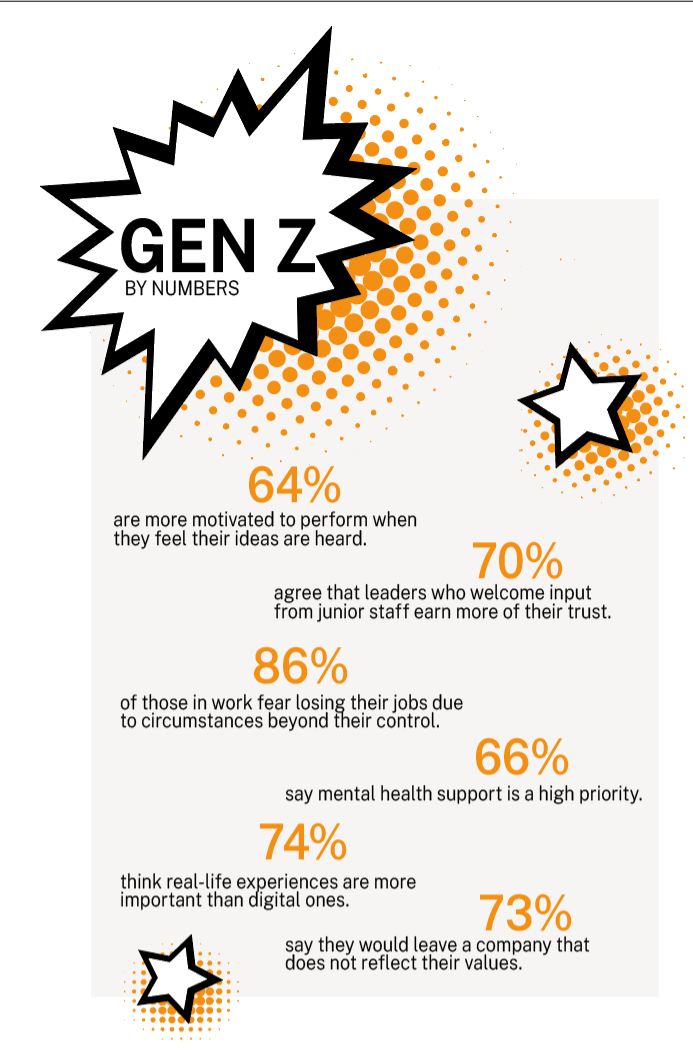
Entry-level hiring is declining. What could go wrong?
Cutting entry-level roles may save costs today, but it endangers the development of future leaders and the skills organizations will urgently need....

by Jackie Cooper Published October 23, 2025 in Talent • 9 min read • 
Gen Z, the cohort born between the mid-1990s and early 2010s, is a mirror of mixed opinions for employers and brands alike. One person’s digital native is another’s entitled disruptor – a label that often reflects generational bias more than actual behavior. To some, Gen Z’s fluency in technology and social media represents an untapped opportunity. To others, it signals impatience and unrealistic expectations. Both views miss a crucial nuance. This generation has grown up navigating complex global challenges. As a result, their standards for transparency, authenticity, and impact are higher. What if most of what we think we know about them is wrong?
As someone connected to more than 400 Gen Zers through the Edelman network, I’ve seen firsthand how misperceptions can derail opportunities to build trust and relevance with a generation that, according to Edelman’s Gen Z Lab research, will soon account for nearly a third of the global workforce and an even larger portion of consumer influence. Here, we challenge the most pervasive myths about Gen Z and offer practical, research-based insights into what this generation wants from the companies they work for, buy from, and believe in.
Last year at the PRCA National Conference in London, I was on stage with a brilliant Gen Z colleague, answering audience questions. A man in the front row asked what many people quietly wonder: “Why is it that Gen Z is so entitled in the workplace?” I responded, “Maybe it’s not them but us that’s the issue.”
Working closely with Gen Z for the past three years has reshaped how I understand their motivations: what initially looked like entitlement was something far deeper. Many Gen Zers were educated in environments that encouraged inquiry and critical thinking, yet their willingness to ask questions is often misread as arrogance or entitlement. Their instinct to challenge hierarchy isn’t rebellion; it’s a reflex, shaped in a world where access to information has always been a tap away. Questioning authority isn’t defiance, either – it’s a way of seeking safety in an uncertain world. Having come of age through two recessions, a pandemic, and ongoing sociopolitical turmoil, Gen Z has learned to ask questions as a form of self-protection.
Our research shows 64% of Gen Z employees are more motivated to perform well when they feel their ideas are heard, and over 70% agree that leaders who welcome input from junior staff earn more of their trust. For employers, this means Gen Z thrives in environments where curiosity is cultivated, not crushed. Managers who treat questions as threats risk stifling innovation. Instead, leaders must foster a feedback-rich culture where questions become the starting point for better solutions. When Gen Z asks about promotions, raises, or leadership commitments, it’s not presumptuous. It’s rooted in fear of falling behind in an unpredictable economy: 86% of employed Gen Zers report fearing job loss due to circumstances beyond their control.
Work-life balance is a priority, not a perk, for Gen Z. They want flexibility, mental health support, and authentic inclusion. Mental health support emerged as more important than salary for the youngest working generation, with 66% believing it to be a high priority. They want to be nurtured in their careers, with clear pathways for progression that don’t require playing politics. Structured mentoring, visible career tracks, and reverse mentoring opportunities can go a long way in retaining top talent. Far from dodging responsibility, Gen Z is taking steps to protect their long-term ability to thrive. For many, setting boundaries or prioritizing self-care is a strategy for sustaining performance, even if it might be perceived as a retreat.
As consumers, Gen Zers are just as questioning. Seven in 10 always fact-check and will unfollow a brand that isn’t truthful. Curiosity is how they navigate a world of constant choice and complexity. They expect honesty, accountability, and the ability to interact with brands that are open to feedback and two-way exchange. This appetite for clarity is matched by a desire to influence. Not only do they bring societal conversations into the workplace (67% say they do), they expect CEOs to speak out on these issues (69% agree).
Gen Z is not here to passively adapt. They want to co-create the future – with their employers, with the brands they buy from, and with each other. What may appear as assertiveness or entitlement is often a coded message: “I’m worried. Show me I’m safe here.”
Loyalty, for Gen Z, isn’t about staying with one company for decades; it’s about alignment with their values and growth. Our research shows that 73% of Gen Z say they would leave a company that doesn’t reflect their values. They are far more likely to remain with employers who invest in personal development, take public stances on social issues, and support community well-being. Loyalty is earned through purpose and progress.
The same principle applies to purchasing habits. Gen Z’s loyalty is conditional on a brand’s transparency, consistency, and ability to demonstrate values in action. They want brands to engage in real dialogue, but most importantly, they expect accountability when things go wrong and authenticity in how brands show up, especially online. The majority of Gen Z say they’re more likely to support a brand long-term if it takes accountability for its mistakes publicly. Gen Z wants follow-through and action, not just messaging. Brands that consistently demonstrate this are the ones that earn trust and repeat engagement.

Gen Z may be the first true digital natives, but that doesn’t mean they want to live entirely online. While their digital fluency can lead to assumptions that they prefer virtual experiences, the truth is more nuanced. This generation values technology for what it enables – connection, access, and creativity – but they’re equally vocal about the importance of real-world interaction, physical spaces, and offline authenticity.
As it turns out, 74% of Gen Zers think real-life experiences are more important than digital ones, compared to 66% of millennials. Whether it’s immersive pop-ups, meaningful brand activations, or community-driven events, they want to engage all five senses, not just scroll. The same applies in the workplace. Hybrid flexibility is appreciated, but there’s still a desire for face-to-face collaboration, mentorship, and culture-building.
For brands and employers, this is a reminder not to go all-in on digital-only strategies. The opportunity lies in blending the online with the offline – meeting Gen Z where they are, but also where they want to be.
Much has been said about Gen Z’s impact on workplace culture, from “quiet quitting” to the “Gen Z stare” or “task masking”. These terms, often born on TikTok, spark headlines and debates about professionalism and shifting norms. If we look closer, what Gen Z is doing isn’t new – it’s simply naming and sharing things older generations have quietly done for decades.
Procrastination, burnout, and multitasking have always existed in the workplace. What’s changed is that Gen Z is putting a name to these patterns. By broadcasting these experiences, they’re demystifying, not undermining, work culture. They’re creating shared language around topics that used to be taboo: stress, boundary-setting, productivity guilt, and rest.
Rather than dismissing these behaviors as laziness or disengagement, leaders should view them as an opportunity to update how we talk about work. Gen Z is reframing the workplace, rather than rejecting it. That creates space for more honest conversations about what people need to thrive.
There’s a common assumption that Gen Z is overwhelmingly liberal or progressive. While it’s true that many Gen Zers are vocal about issues like climate change, mental health, and equity, this doesn’t mean they fall neatly into traditional political categories. Our research reveals that Gen Z is more politically diverse than many assume. What unites them is not ideology, but a desire for action, authenticity, and transparency.
This generation is less interested in partisan labels and more focused on whether institutions – governments, companies, and media – are solving real problems. They’re skeptical of political theater, but deeply invested in social and economic outcomes. This mindset affects how they interact with brands. Gen Z doesn’t expect every company to take a stand on every issue, but they do expect consistency when values are claimed.
Gen Z isn’t defined by party lines. They’re defined by pragmatism and expectation. Brands that engage them through a values-first, action-led lens will earn more than votes; they’ll earn trust.
When it comes to trust, Gen Z isn’t cynical; they’re selective. Our research finds they place the most trust in individuals: creators, peers, subject-matter experts, and those who “walk the talk”. They remain skeptical of traditional institutions like media, government, and even business leadership, unless those entities prove consistency, transparency, and real-world impact.
Gen Z has grown up amid global instability, disinformation, and corporate overpromising. As a result, they’re not easily swayed by polish or prestige. Trust is built from the ground up, through lived actions and accountability. For brands and employers, this means amplifying credible voices inside and outside their organization, and showing, rather than telling, what their values look like in practice.
Understanding Gen Z is only half the battle. Building genuine, lasting relationships with them requires meaningful action. Their expectations are high, but so is their capacity for brand loyalty and employee advocacy when they feel truly seen and supported. Here are some first steps businesses can take to move from understanding to impact:
1. Start by listening. Before you build anything for Gen Z – a campaign, product, or workplace policy – you need to understand where they’re coming from. Social listening, community panels, and Gen Z councils offer invaluable insight into what they value. This upfront investment ensures you’re acting on real needs, not assumptions.
2. Empower young talent. Give Gen Z a seat at the table – in product development, brainstorms, and strategy. Beyond inclusion, this is about tapping into a generation that brings fresh perspectives, digital fluency, and a deep understanding of cultural trends. Involving Gen Z meaningfully can sharpen relevance, deepen engagement, and future-proof your thinking.
3. Be action-oriented. Talk less, do more. Authenticity isn’t about being perfect; it’s about being accountable. Growing up in environments saturated with brand promises, Gen Z has developed a sharp radar for anything that feels performative. They’re looking for progress over perfection: real steps forward, backed by evidence, honesty, and humility. Inaction or vagueness erodes trust, but transparent, values-led action earns it.
4. Co-create the future. Gen Z doesn’t want to inherit broken systems; they want to help fix them. This generation values collaboration, transparency, and shared ownership. They are eager to be part of shaping solutions. Businesses that treat young people as collaborators, not just customers or employees, are the ones that will thrive. Creating meaningful ways for Gen Z to contribute signals respect and builds real investment and advocacy.
In a world defined by flux and uncertainty, Gen Z is a compass for what comes next. They’re not here to tear things down, but to ask questions and help build something more meaningful. They expect more from the institutions they work for and buy from, and in doing so, push us all to raise our standards on what it means to lead, act, and grow with integrity. Don’t see that as a threat. It’s a wake-up call – and an opportunity.

Global Chief Brand Officer and Senior Advisor at Edelman
Jackie Cooper is Global Chief Brand Officer and Senior Advisor at global communications firm Edelman. The first woman inducted into the PR Week UK Hall of Fame, she advises celebrity chef Jamie Oliver and the Ken Robinson Foundation, and founded Edelman’s Gen Z Lab. Previously, she co-founded award-winning PR and marketing agency JCPR.

February 19, 2026 • by Robert Hooijberg in Talent
Cutting entry-level roles may save costs today, but it endangers the development of future leaders and the skills organizations will urgently need....

February 16, 2026 • by Zhike Lei in Talent
Some of China’s most profitable companies have thrived by piling pressure on workers – sometimes with tragic results. Zhike Lei outlines how multinationals can design work that avoids burnout and exploitation. ...

February 5, 2026 • by Katharina Lange in Talent
Entry-level roles give new recruits an opportunity to develop intuition and judgment. But a lack of humility could be stunting the development of future leaders, argues IMD’s Katharina Lange. ...

January 27, 2026 • by Ulrika Karnland, Katarina Norén in Talent
ABB Sweden’s 120-year-old graduate trainee program has survived wars, crises, and industry upheaval. What does its endurance reveal about building talent for the long term?...
Explore first person business intelligence from top minds curated for a global executive audience